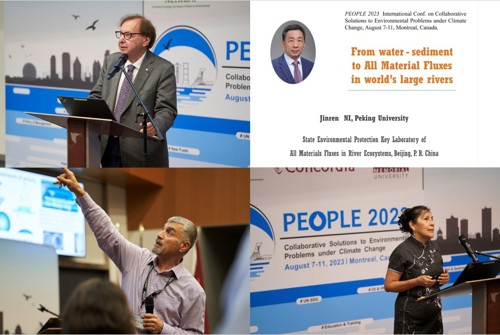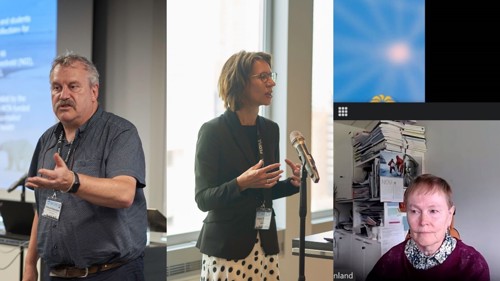PEOPLE 2023 International Conference held on August 7-11 in Montreal, Canada

PEOPLE 2023 International Conference was successfully held on August 7-11 in Montreal, Canada and online. The conference hosted 210 presentations from diverse disciplines from 20 countries and 42 technical sessions in 21 themes.
This featured 4 plenary keynotes, 1 special talk, 15 technical keynotes, 2 workshops, 160+ oral presentations, 20 poster presentations, and ~300 registrants in-person and online.

Photo: Plenary keynote speakers (top to bottom, left to right): Dr. Howard Alper (Companion, Order of Canada; Fellow and former President, Royal Society of Canada; Professor, University of Ottawa, Canada), Dr. Jinren Ni (Fellow, Chinese Academy of Sciences; Professor, Peking University, China), Dr. Ibrahim M. Banat (Fellow, Royal Society of Biology; University of Ulster, UK), and Dr. Rosa Galvez (Senator, Senate of Canada; Professor, Université Laval)
The University of the Arctic was the major partner of the conference and UArctic researchers played important roles. The Conference was chaired by Dr. Bing Chen, UArctic Chair in Marine and Coastal Environmental Engineering and Professor from Memorial University (Canada). A special session, “Chemicals of Emerging Arctic Concern: Sources and Environmental Fate”, was organized and chaired by Dr. Roland Kallenborn, UArctic Chair in Arctic Environmental Pollution Research and Professor from Norwegian University of Life Sciences (Norway), and Dr. Katrin Vorkamp, Professor from Aarhus University and Arctic Research Centre (Denmark). Dr. Arja Rautio, UArctic former VP Research, Mimir Member, and Professor of Arctic Research at University of Oulu (Finland), gave a keynote speech on “Pollution and Community Health in The Arctic” and chaired a technical session. Some of other UArctic researchers and students from various institutions also attended the event in person or virtually.

Photo: UArctic researchers were presenting in-person and online (from left to right): Dr. Roland Kallenborn, Dr. Katrin Vorkamp, and Dr. Arja Rautio.
This is also the 6th annual conference of the global Network on Persistent, Emerging and Organic Pollution in the Environment (PEOPLE Network), and co-hosted with Memorial University and the Concordia Institute of Water, Energy and Sustainable Systems of Concordia University, along with partners including the University of the Arctic, the International Water Association Young Water Professionals Canada (IWA-YWP Canada), and special issues from supporting Journals Environmental Systems Research (Springer Nature), Marine Pollution Bulletin (Elsevier), and Water (MDPI). The PEOPLE Network has more than 200 professional members, plus over 200 students, from over 30 institutions and 50 partners from private and public sectors and community groups in Canada and worldwide. It is the largest consortia of its kind dedicated to research, development and education on persistent, emerging and organic pollution by cross-nation, cross-institution, and cross-disciplinary approaches. It has been mainly funded by the Natural Sciences and Engineering Research Council of Canada (NSERC).

Photo: Attendees participating in conference workshops, opening, technical sessions, social events, and award ceremony.
PEOPLE 2023 successfully brought together scientists, regulators, practitioners, and community representatives who are interested in seeking and developing collaborative solutions to environmental programs from traditional to emerging ones worldwide under the changing climate. It called for collaborative efforts on research, development, education and engagement for improved knowledge and better solutions, echoing to PEOPLE Network’s slogan “People create environmental problems, and our PEOPLE help find the solutions.”
The PEOPLE Network and its conferences will continue to provide international venues and gather researchers and professionals from diverse sectors and disciplines in natural science and engineering, health, social science, and humanities, to present their achievements and innovations, spark ideas, share information, grow connections, and explore opportunities. Arctic environments and communities under climate change have always been the key priority areas of the PEOPLE Network. With the leadership of Dr. Bing Chen and his dual roles with PEOPLE and UArctic, the partnership will continuously grow through various activities and help connect more researchers, students, communities, and private/public partners globally.
